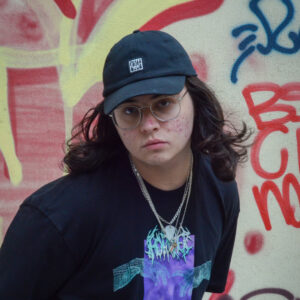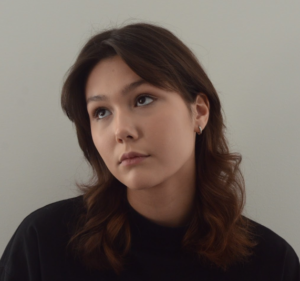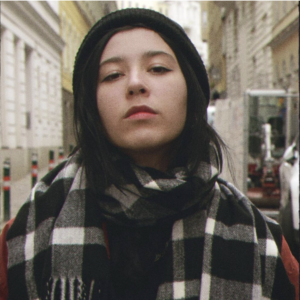16 year-old Sofiya Tkachenko interviews 19-year-old musician and producer Bogdan “SadSvit” Rozvadovskyi

April 26, 2023, Vienna, Austria. Bogdan “SadSvit” Rozvadovskyi was interviewed by Sofiya Tkachenko during his visit to Vienna.
May 19, 2023
‘Quantity of good Ukrainian music has risen on an aspirational scale’
Since the full-scale invasion of Ukraine, a lot of Ukrainians rejected media and culture in the Russian language. Many then discovered Ukrainian music. It is a huge win in itself for Ukrainian culture, but how did it affect Ukraine’s music industry?
I invited a Ukrainian artist, 19-year-old Bogdan “SadSvit” Rozvadovskyi, to discuss the influence the invasion had on music – and vice versa. “SadSvit”, who now has over 500,000 monthly listeners on Spotify, has gained recognition for his album “Cassette” and the single “Syluety”.
He came to Vienna from Poland, where he is now working with other artists on developing Ukrainian music.
Rozvadovskyi started making music as a young 13-year-old boy from Ivano-Frankivsk, a city in Western Ukraine. “It all started when my mom gave me my first laptop. I said it was for studying, but instead, I downloaded a program for producing music,” he recalled.
“First, I started experimenting with different beats and styles, like techno. When I turned 15, I realised that my skills were enough to monetize them. I wanted to be financially independent. I started doing freelance work, making instrumental backing, and compiling tracks for other local artists. Soon enough I realised that I wanted to create something of my own, so I started writing songs and putting them on SoundCloud.”
When talking about the genre of his music, Bogdan is not limiting himself to any specific one: “It all started with indie rock but I realised that every genre is exciting for me. Sometimes I can work in the genre of bedroom pop, but then I have the urge to produce a whole album of techno songs. I love experimenting and the audience seems to enjoy it as well. The genre is not as important as the meaning behind the music for me.”
Bogdan added that although he was very young when he started his career, people in the industry were welcoming and gave him huge amounts of support that helped his music evolve and succeed.
The situation changed after Russia launched its full-scale invasion of Ukraine. Even though Ukrainian artists are being celebrated in their country, it is harder to break through. “Even in social media, you can see a lot of people self-promoting because Ukrainian music has gained more attention. But in most cases, it does not equal recognition at the end,” Bogdan observed.
“Compared to the pre-full scale invasion [period], you now need to not only have luck in getting discovered but your content also needs to have quality. This truly increased the amount of attention artists are paying to their music. The quantity of good Ukrainian-made music has risen on an aspirational scale.”
Before the full-scale invasion, Ukrainian culture was significantly corrupted by Russian influence. Despite the dissolution of the Soviet Union, for centuries prior the Russian language was enforced on Ukrainians, both them – as well as people outside of Ukraine’s borders – stopped differentiating one language from another. This applied to music as well.
February 24, 2022, has largely put an end to it and many consider this the only positive result of the full-scale invasion. The Kremlin’s actions pushed people in Ukraine to stop consuming Russian content and discover Ukrainian culture.
Also written by Sofiya:
People started to research the source behind songs they listened to and how it affected the occurring war. Many realised that in the digital economy of the 21st century, listening to particular music then translated into these artists receiving money and paying taxes in their country. Ukrainians listening to Russian artists were indirectly financing the military forces of Russia.
Bogdan is one of those who perceive the process as positively influencing Ukrainian culture.
“Right now the history of Ukrainian music is being written. It was repressed for such a long time that it is only forward from here. By trial and error – and by error I mean ‘scharovarschyna’ – we are discovering and evolving at our own pace and soon enough it will be recognised as the gem it is”.
In terms of the future of Ukrainian music on the international stage, I wanted to ask Bogdan what he thought we needed to gain to achieve identification and separate ourselves from Russian culture.
“Firstly, we need to stop consuming Russian content altogether, because not only does it promote the wrong idea, the idea that our culture is intertwined, but it also funds those artists. A lot of people need to team up – the media, artists, and influential people – in order to give a boost to Ukrainian music and to reach more people with the suggestion to embrace what we have instead of promoting the music of the aggressor.”
“Secondly, we need to win the war and start rebuilding. Not only buildings and infrastructure but also our culture. Because there will come a moment of exhaustion after such a long fight, but we still need not forget that there is a future.”
“We will need to shift our mentality to a more Western one. Right now a lot of issues that have already been addressed in Western countries are still not quite in place in Ukraine, for example, our approach to the feminist movement. With this merge, we will gain more topics to sing about, which will resonate with the international listener and that is exactly how we will enrich our culture even more and further interest the public outside of Ukraine,” Bogdan said.
Before the 24th of February and currently, there are quite a lot of originally Ukrainian artists who worked or still continue working with Russian musical distributors or produce music that serves both Ukrainian and Russian listeners.
When I asked about this, “SadSvit” had answered: “The war didn´t start on the 24th of February, it started in February 2014 with the annexation of Crimea and that was the moment when we, Ukrainian artists, should have broken off any contact with Russia”.






